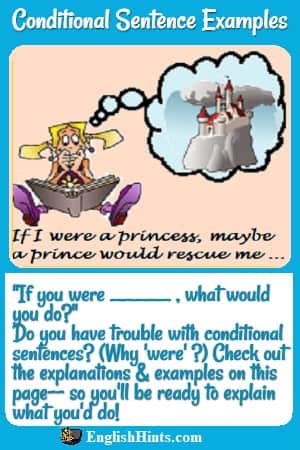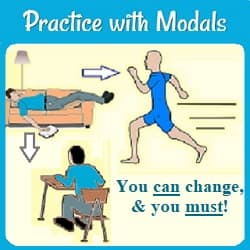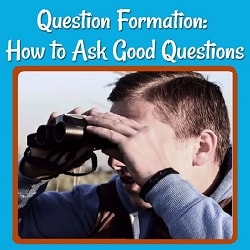What Is a Conditional Sentence?
A conditional sentence tells what would or might happen under certain conditions.
It most often contains an adverb clause beginning with ‘if’ and an independent clause. The 'if' clause gives the condition in which the other clause would be true. The independent clause usually includes a modal verb like ‘will,’ ‘would,’ ‘could,’ or ‘might.’
For example: "If it’s cold, I’ll wear a jacket” or “I’ll (I will) wear a jacket if it’s cold.” Either clause can go first. “If Johnny had studied, he would have gotten a better grade” or “Johnny would have gotten a better grade if he’d studied.”
(See Complex Sentences for more on independent and dependent clauses.)
Types of Conditional Sentences
There are four kinds of conditionals:
The zero conditional is present tense and expresses a fact. It tells about something that always happens under certain conditions.
- If people get hot, they usually sweat, but if dogs get hot, they pant.
- If plants don’t get any water, they die. (Plants die without water.)
- When babies are hungry, they cry.
The 1st conditional tells what may happen in the future if a certain condition is met:
- “If you study hard, you will be a success.” (or: “If you study hard, you might get into Harvard.” or: “If you study hard, you’re going to do well in school.”)
The 2nd conditional imagines what would happen if something were true-- but it’s not. This is often called the “present unreal conditional.” The verb after the ‘if’ is in simple past form, even though it’s talking about the present. This tells listeners that the suggestion is imaginary, not true.
(In formal use the verb ‘be’ is also in plural form, even for singulars, as another clue. See “if something were true” above. Speaking casually, many people use ‘was.’)
- “If I were president, I would make some big changes.”
- “What would you do if you had a million dollars?” ”Well, first I would pay off all our debts, and take my wife on a cruise. Then I would set up a trust fund for our grandchildren...”
(Notice that each situation is clearly imaginary. You and your listeners both know that you are not going to be president. You're not likely to get a million dollars, either!)
The 3rd conditional talks about how the past might have been different if different steps had been taken. (But they weren't! Again, it's imagining something that is no longer possible.)
The verb after the ‘if’ is (again) farther into the past. In this case it's a past perfect. The independent clause is a conditional perfect using would or another modal verb.
- “If you had studied, you would have passed that exam.”
- “If she hadn’t gotten sick, she might have won the singing contest.”
- “If that car had been two seconds later, it would have hit you.”
- “If I had known the trouble you were having, I would have been more gentle and more caring...” (from a poem.)
- “I would have listened to you if you had practiced what you preached.”
See Modal Verbs for more about using 'will,' would,' 'might,' and other modal verbs that can help form conditional tenses.
Other Related Pages
Practice using modals by studying the examples, then choosing the correct verb forms to fill in the blanks in several conversations.
How to make negative sentences in English: a guide to helping verbs, negative words, and traps to avoid, with examples of each.
How to form questions in English: a simple explanation with lots of examples using question words and helping verbs.
Home> English Verb Tenses> Conditional Sentences.
Didn't find what you
needed? Explain what you want in the search box below.
(For example, cognates, past tense practice, or 'get along with.') Click to see the related pages on EnglishHints.
| site search by freefind | advanced |









